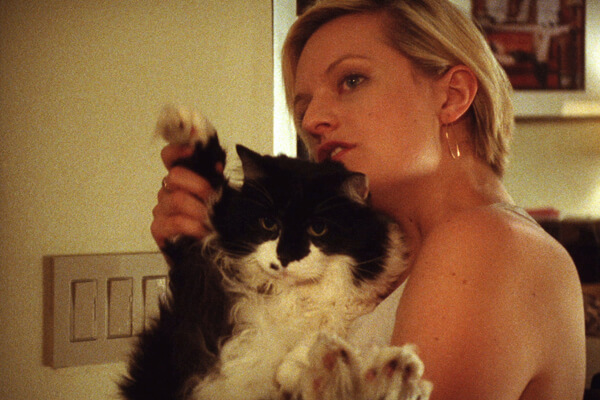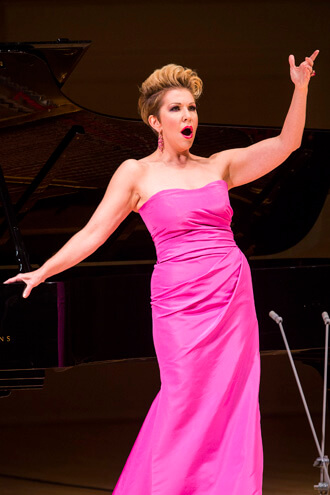Daniel Miroslaw the lounge chair, with Kara Sainz standing behind him holding his hand in the Juilliard Opera production of “Il Turco in Italia.” | KEN HOWARD
BY DAVID SHENGOLD | Juilliard Opera did very well by the good — not great — Rossini comedy “Il Turco in Italia” on November 19. Speranza Scappucci, conducting and playing continuo, guaranteed a scintillating, stylish performance for the fine orchestra, though a few inevitable first night “accidents” obtruded. One hopes to hear much more of her work hereabouts.
John Giampietro and his design team went for the 1960s look; surely — please! — the vogue for staging everything a la “Mad Men” and “La Dolce Vita” must end soon. But at least no group Polaroids were taken, and the blocking and characterizations, including those of the sonorous choristers, proved fluid and successful.
It’s hard to care about this opera’s nasty, selfish characters; if anything, the two protagonists (Fiorilla and Selim) seemed in this cast too normal and charming. The titular Turk was Michael Sumuel, already in the professional realm with an extremely cultivated bass-baritone that shows off admirable agility. Looking lovely, Hyesang Park’s Fiorilla fielded a lovely, coruscating soprano that flowed effortlessly. She aced her big scena but should have omitted the anachronistic pennywhistle high note at its close.
Rossini, verismo, Rachmaninov, Handel
The most individual sound among the students came from bass Daniel Miroslaw, an excellent, firm-voiced Geronio and a fine comic actor, albeit too young and handsome for his part. Kara Sainz made a fine “seconda donna,” with a fresh, appealing mezzo. As the Pirendellian playwright Prosdocimo, who shapes the action as it proceeds, Szymon Komasa seemed to be channeling Neil Patrick Harris as Barney; he sang energetically with a certain throatiness and iffy Italian. The two tenors showed correct musicianship but not the proper instruments for this particular, testing vocal style. As an ensemble effort, this attractive, well-conceived “Turco” provided much to enjoy.
Teatro Grattacielo, on November 18, held an under-attended gala at Skirball/ NYU. For 20 years, Duane Printz’s troupe has valiantly presented concert readings of verisitic repertory, uncovering much of interest. The concert both revisited past repertory choices and signaled a few in the company’s pipeline. It was particularly good to hear, from the former, Act IV of Alfano’s “Risurrezione” with strong, moving singing from Kerri Marcinko and Stephen Gaertner.
In the latter half, I enjoyed Israel Gursky’s reading of Wolf-Ferrari’s delightful “La Dama Boba” Overture and the visually and vocally glamorous Tiffany Abban doing diva-quality work in Giordano’s “Siberia.” Some other Grattacielo stalwarts like Megan Monaghan, Anna Tonna, and Ashraf Sewailam contributed nice turns.
Cult diva Aprile Millo won cheers for just showing up. Her singing in the maudlin final scenes of “Zaza” and “Cecilia” showed her wonted committed — if highly emphatic — style. I expected greater verbal accuracy and specificity. Much of Millo’s powerful voice remains intact; the roles that might best exploit her current resources are Puccini’s Giorgietta — created, like Cecilia, by Claudia Muzio — and Prokofiev’s Fata Morgana, premiered by Nina Koshetz.
On November 21 at Boston’s venerable Symphony Hall, it was exciting to see the chemistry between the BSO players and their dynamic new conductor Andris Nelsons live up to its billing. Nelsons, very energetic, is demonstrative with the musicians, not showing off to the crowd, and proved himself in fine control of every aspect of a difficult program. The admirable Tanglewood Festival Chorus offered two recent pieces, an amusingly Handelian one by John Harbison and an attractive New Romantic world premiere by Eriks Esenvalds. Yo-Yo Ma appeared for a phenomenal rendition of the Prokofiev “Sinfonia Concertante,” tossing off its spectacular difficult cadenzas.
The vocal portion came with Rachmaninov’s Poe-based orchestral poem “The Bells,” with the TFC again demonstrating great ensemble and tone. Pavel Cernoch’s dark lyric tenor tended to flat and to monochrome, but soprano Victoria Yastrebova fielded a pleasant, not conventionally shrill Russian soprano and showed welcome dynamic variety. Truly sensational singing poured forth expansively from young Lithuanian bass-baritone Kostas Smoriginas. Remember the name: he sounded like a young Tom Krause and sang with the same musicality and commitment.
Handel’s “Alcina,” heard in concert at Carnegie Hall October 26, proved definitively that baroque opera doesn’t need to be ground into witless pastiches to grab an audience and can instead attract a substantial following if casting and conducting promise rewards. Harry Bicket’s alert, enlivening work with the English Concert was one key factor. Another was the fabulously talented Joyce DiDonato in the demanding title role. She proved herself up to the soprano demands of the complex character; her bewitching singing in tough music sounded like falling off a log. Stance, gaze, utterance of words and dynamic play made a complete moment of every aspect of Alcina’s harrowing journey out of being loved: a triumph. Bring on Cleopatra, Agrippina, Nitocris, and more Handelian roles!
Alice Coote nailed Ruggiero’s swagger, and his two wonderful slow arias — “Mi lusinga” and “Verdi prati” — were both deeply satisfying. Coote’s voice is maturing out of Handel and now has trouble with long lines and rapid passagework, so the two contentious early arias were cautious and unlovely, with lots of extra breaths. The treacherously demanding “Sta nell’ircana” nearly defeated both Coote and the horns. Yet she remained an artistic force. As they have demonstrated in “Cendrillon,” DiDonato and Coote have tremendous stage chemistry, sparking off one another.
Morgana, lesser witch sister to Alcina, is a gift — Anna Christy’s soubrette handled her duties capably and amusingly if without ultimate vocal distinction. The other four soloists doubled as chorus. Christine Rice’s Bradamante showed a well-practiced Handelian stylist with remarkable coloratura fluency in “Vorrei vendicarmi”; her timbre itself, while solid, seems rather ordinary. One wished the excellent bass Wojtek Gierlach (Melisso) had more to sing. Not so the just barely adequate Ben Johnson (Oronte), his tenor and deportment lacking charm, an element essential to making this multiply-betraying character palatable. By design, Oberto’s three arias can be dispensed with; Anna Devin was brightly fluent if no better than senior Juilliard students might have been.
This was a fine ensemble effort on a masterwork, with DiDonato and Bicket ‘s work unforgettable.
David Shengold (shengold@yahoo.com) writes about opera for many venues.



































